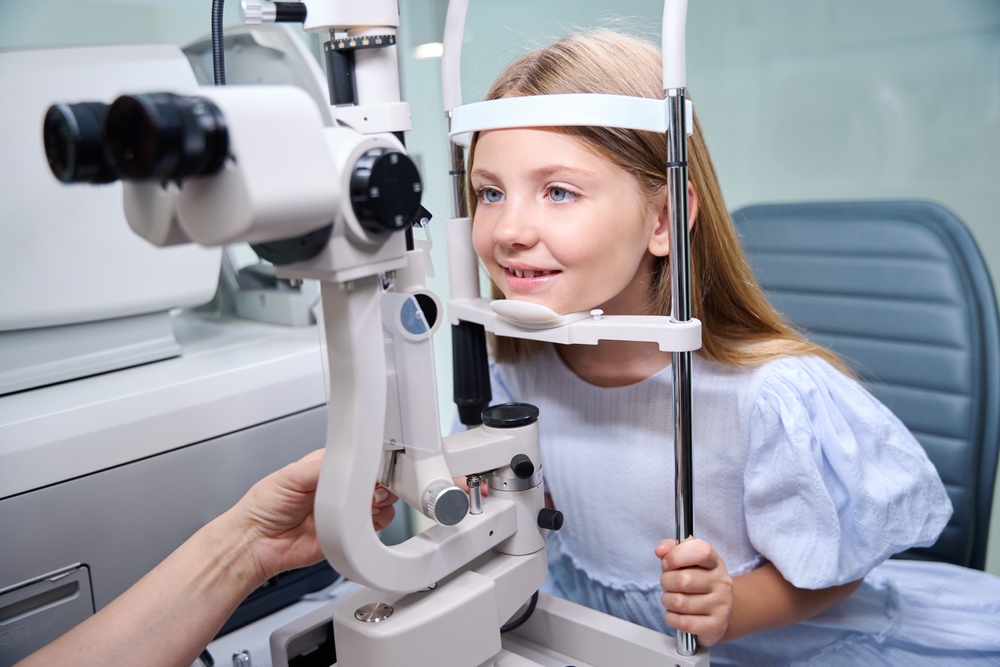
As a parent, ensuring your child's overall well-being is of utmost importance. One aspect that is often overlooked is the health of their eyes. Regular pediatric eye exams play a crucial role in maintaining your child's visual development and catching any potential issues early on.
What is a Pediatric Eye Exam?
A pediatric eye exam is a comprehensive assessment of your child's visual system, conducted by a licensed optometrist who specializes in the care of children's eyes. During this exam, the doctor will evaluate various aspects of your child's vision, including:
• Visual acuity: This measures how clearly your child can see at different distances.
• Refractive errors: The doctor will check for conditions like nearsightedness, farsightedness, and astigmatism.
• Eye movement and alignment: They will assess if your child's eyes are working together properly.
• Color vision: The exam may include tests to identify any color vision deficiencies.
• Eye health: The doctor will examine the internal and external structures of the eyes for any signs of disease or abnormalities.
The Importance of Regular Eye Exams for Children
Regular eye exams are crucial for children's visual development and overall health. Vision plays a critical role in a child's physical, cognitive, and social development. By identifying and addressing any vision problems early on, you can ensure your child has the best possible chance of achieving their full potential.
Eye exams can detect a wide range of issues, from refractive errors and lazy eye (amblyopia) to more serious conditions like eye cancer or neurological disorders. Early detection and treatment of these problems can prevent long-term complications and help your child thrive.
What Can a Pediatric Eye Exam Detect?
A comprehensive pediatric eye exam can detect a wide range of vision and eye health issues, including:
· Refractive errors (nearsightedness, farsightedness, astigmatism)
· Lazy eye (amblyopia)
· Eye misalignment (strabismus)
· Color vision deficiencies
· Neurological disorders that affect vision
· Eye injuries or trauma
· Developmental delays in visual processing
By identifying these problems early, your child's eye doctor can provide the appropriate treatment or management plan to ensure your child's eyes remain healthy and their vision develops properly.
When and How Often Do Children Need Eye Exams?
The American Optometric Association (AOA) recommends the following eye exam schedule for children:
• First eye exam: 6 months of age
• Second eye exam: 3 years of age
• Third eye exam: Before starting kindergarten (around 5-6 years of age)
• Subsequent exams: Annually or as recommended by the eye doctor
Your eye doctor can provide more personalized recommendations based on your child's unique circumstances, such as family history, risk factors, or any existing vision problems.
The Benefits of Early Detection and Treatment
Early detection and treatment of vision and eye health issues can have a profound impact on a child's development and overall well-being. Vision problems can significantly impact a child's ability to learn and perform well in school. Early intervention can help ensure your child has the visual skills necessary to succeed academically.
Vision problems can also lead to difficulties with hand-eye coordination, depth perception, and social cues, which can impact a child's social and emotional well-being. Addressing these issues early can help your child thrive in their social interactions.
Untreated vision problems can worsen over time and lead to more serious complications, such as permanent vision loss or eye health issues. Early detection and treatment can prevent these long-term consequences.
Additionally, when a child's vision is functioning optimally, they are more likely to feel confident and engaged in their daily activities. This can have a positive impact on their overall self-esteem and well-being.
Prioritizing Your Child's Vision and Eye Health
Protecting your child's eye health should be a top priority. Regular pediatric eye exams are essential for ensuring your child's visual development and catching any potential issues early on. By following the recommended exam schedule and being vigilant for any signs of vision problems, you can help your child achieve their full potential and maintain optimal eye health throughout their childhood and beyond.
At Luke Eye Associates, we are dedicated to providing comprehensive and personalized eye care for children of all ages. Contact us to schedule your child's next eye exam and take the first step in prioritizing their eye health. Visit our office in Midland, Texas, or call (432) 220-2700 to book an appointment today.




